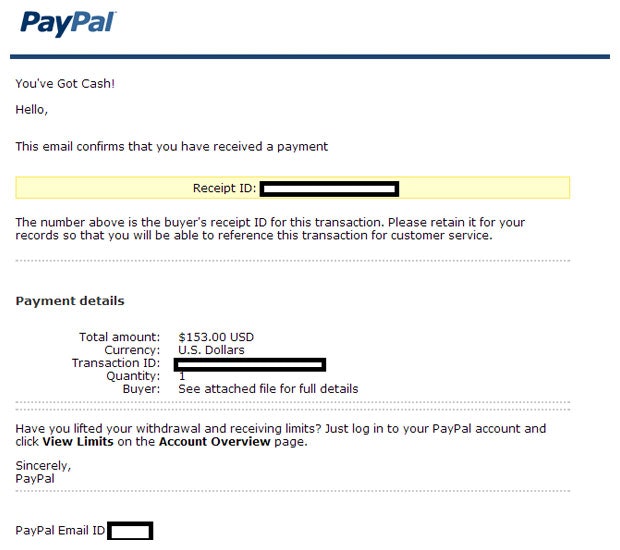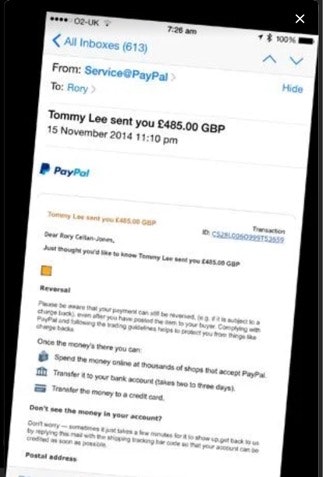- What Are eBay/PayPal Scam Emails?
- How to Beat and Avoid eBay/PayPal Scam Emails
- Red Flags of eBay/PayPal Email Scams
- Examples of Fake eBay PayPal Scam Emails
- What to Do if You’ve Fallen for eBay PayPal Scams
- Frequently Asked Questions
When you use eBay, you may receive email notifications regarding items you’ve bought or sold. Since eBay accounts are often linked to PayPal accounts, you may not think anything of it when you receive an email concerning your eBay transaction. However, you should proceed with caution—eBay PayPal scams exist.
What Are eBay/PayPal Scam Emails?
Fake PayPal emails aim to scam you out of your money or steal your financial and personal information. This is how the eBay PayPal scam works.
You Sell an Item on eBay
After selling an item on eBay, the buyer asks for your email address or requests your contact information from eBay. At this point, you’re waiting for payment confirmation for your item and haven’t sent it to the buyer yet.
You Receive an Email That Appears to Come From PayPal
You receive an email stating you have received a PayPal payment for an order, and the funds have been deposited into your PayPal account. If you do not have a PayPal account, the email might contain instructions to set one up using a link that appears to lead to PayPal.
Example Fake PayPal EmailYou've Got Cash!
Hello,
This email confirms you've received a payment.
Payment details:
- Total Amount: $150.00 USD
- Currency: USD
- Transaction ID: ebay43092
- eBay ID: john1234
Sincerely,
PayPal
You Send the Item
You believe you’ve received payment for the item the buyer purchased, so you ship the item to the buyer. Unfortunately, you’re unaware that the email you received from PayPal with payment confirmation was fake.
You Have Not Actually Been Paid
After shipping the item, you realize that you have not actually received payment. When you log into your PayPal account, the money is not there. The scammer has stolen your money as well as the item.
Your Identity and Financial Information Could Be At Risk
In another form of the scam, you may receive a phishing email that looks as though it’s from PayPal, perhaps referencing a recent eBay transaction. The email may ask you to provide information using a link that appears to lead to PayPal. If you click the link, your identity and financial information could be compromised.
In a slightly different version of this scam, you may receive a fake email from “PayPal” indicating you’ve sent payment for an eBay purchase you didn’t make. If you click on the link provided to cancel the payment, the scammer could access your data.

- Products from well known brands
- Buyer protection via PayPal
- Extensive seller ratings & reviews
How to Beat and Avoid eBay/PayPal Scam Emails
Scammers can make their fake PayPal emails look very convincing, using the correct logos, design, and even using your real name and information. Fortunately, there are several ways to beat this scam.
Beat this Scam
To beat fake PayPal email scams when using eBay:
- Check your PayPal account before sending items: When you receive an email claiming to be from PayPal, log into your PayPal account directly. If the funds aren’t there, the email is fake. If PayPal was really trying to reach you, you’d also be able to view the message directly in your PayPal account.
- Do not click links in emails: If the scammer includes links in the PayPal email, do not click on them. This is a phishing attempt, which could result in the scammer gaining access to your data or financial information. In addition, a virus could also be installed on your computer or device.
- Keep all communications and payments within eBay: All sales on eBay can be processed within eBay directly. A buyer will never need your email address to complete a transaction.
It's important to verify links and contact details to beat imposters.
Red Flags of eBay/PayPal Email Scams
Scammers use any number of techniques to trick you into handing over your information or to convince you you’ve been paid. When you receive an email that looks as though it came from PayPal and concerns an eBay transaction, look for these red flags:
- Grammatical and spelling errors
- Requests for your PayPal email address
- Requests for postal tracking numbers
- Requests for financial and other personal information
- Generic greetings
- Sender's address not coming from an @PayPal.com email
Grammatical and Spelling Errors
In typical scammer fashion, fake emails tend to be full of grammatical and spelling errors and look like they’re coming from someone who’s not a native English speaker. Genuine PayPal emails very rarely, if ever, have any typos or grammatical errors.
Requests for Your PayPal Email Address
If someone asks for your PayPal account or email address, it’s a sure sign you’re dealing with a scammer. Legitimate eBay users do not need to use your email address or PayPal account to process a transaction—the entire buying and selling process should occur seamlessly through eBay.
Requests for Postal Tracking Numbers
Fake eBay PayPal emails might request that you send over postal tracking numbers and promise to release payment once you prove that the item has been shipped.
Requests for Financial and Other Personal Information
A legitimate PayPal email would never ask for your bank account number, debit or credit card number, password, or answers to your security questions. If an email requests this information, it’s a sure sign of a scammer’s phishing attempt.
Generic Greetings
Fake eBay PayPal scam emails often begin with greetings like “Dear user” or “Hello, PayPal member.” An actual PayPal email would address you with your first and last name on your PayPal account.
Non @PayPal.com Sender Email
Legitimate emails regarding PayPal payments should come from an @paypal.com email address (usually [email protected]). Fake PayPal emails might say they come from "PayPal Customer Support" or something similar, but when you look at the actual email address, it will be from a random email or something similar to PayPal (e.g., [email protected]).
Examples of Fake eBay PayPal Scam Emails
eBay PayPal scam emails using the PayPal logo and regular PayPal script can be pretty convincing. The recipient in the below email might have fallen for this scam email, but the buyer had also asked to send extra funds and requested that the item be sent to an address in Nigeria, which luckily set off alarm bells for the recipient.

What to Do if You’ve Fallen for eBay PayPal Scams
Whether you’ve clicked on a link in a fake PayPal email or sent an item after receiving an email from PayPal indicating you’ve been paid, here’s what you should do next to limit the damage.
Open Up an Investigation with eBay
In the eBay Resolution Center, open up a non-paying bidder complaint. Explain that the buyer sent you a fake PayPal email indicating they had paid when they had not sent any money. Provide any documentation you have, including the email you received.
Report the eBay PayPal Scam
File a complaint with the Federal Trade Commission (FTC) using its online complaint portal. It’s also a good idea to alert your local police that you’ve been the victim of online fraud.
Report the Fake Email to PayPal
You can alert PayPal that you’ve received a fake email by forwarding it to [email protected]. PayPal will investigate it and confirm if the email is fraudulent.
Secure Your Device
If you clicked on any links in a fake eBay PayPal scam email, make sure to run a full anti-malware scan. This should pick up any possible malware that may have been installed on your computer when you clicked the link.
Contact Your Financial Institution
Get in touch with your financial institution and any cards that may be linked to your PayPal account. Let them know that a scammer may have access to your funds. They may require you to cancel your cards and receive new ones.



Comments